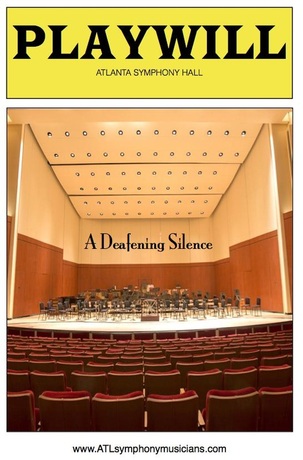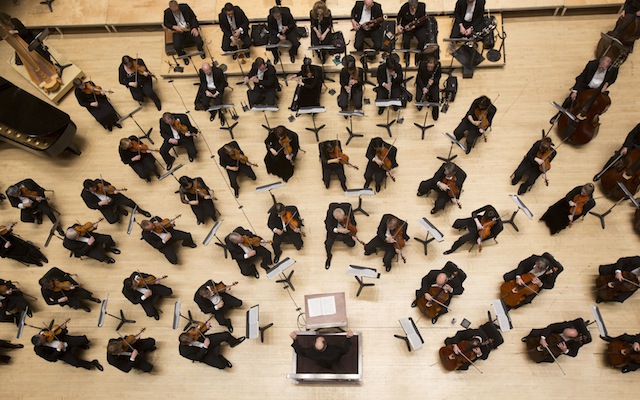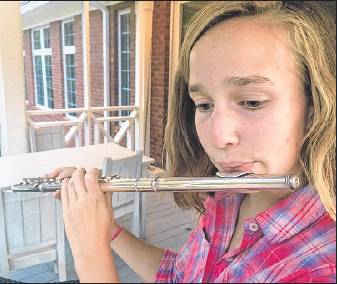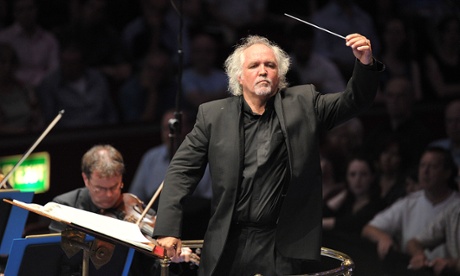trudgemusic the view from stage left
The Quotable WAC Posted on September 28, 2014 | Leave a comment
A few gems from the Woodruff Arts Center Leadership:
“We must make sure the management structure is as efficient as it needs to be without compromising the artistic direction at each of the divisions…The Woodruff Arts Center board has no business telling Robert Spano about the musical direction of the symphony.” – Larry Gellerstedt, Chair, Woodruff Arts Center Board of Trustees, in an interview with Maria Saporta of the Atlanta Business Chronicle, June 2012
Fast-forward:
Mr. Spano said he was troubled by a provision in the latest management proposal that would give it discretion over whether to fill positions, which could further shrink the ensemble. – New York Times, Sept. 2014
…It was important for Hepner and her board to not make “the symphony a scapegoat for everything that’s wrong” at the [Woodruff Arts] Center. “I think it’s easy for everything to get blamed on the symphony,” she said. “But there are other issues.” – Penny McPhee, President of the Arthur Blank Family Foundation, in an interview with Maria Saporta of the Atlanta Business Chronicle, June 2012
Easy to blame everything on the Symphony. Hmmm…
“We all have a real desire to grow the collective audience in Atlanta and the region and the state. There’s more to do,” Hepner said. “But I can tell you, it will be a lot more fun to grow the organization.” – Virginia Hepner, President and CEO, Woodruff Arts Center, in an interview with Maria Saporta of the Atlanta Business Chronicle, June 2012
(Apparently, “growing the organization” means rewarding management failure with large bonuses.)
“We’ll never sacrifice the quality of the art…To me, it’s all about artistic excellence and access…My personal thrill would be that everybody in the community got to see what we do.” Virginia Hepner, in an interview with WABE Radio, Aug. 2012
Fast-forward:
“The lockout is essentially the board and management punishing the orchestra… It’s a one-sided attempt to force the orchestra to its collective knees. It also paints the orchestra as this intransigent group of musicians. But in fact they have shown extraordinary willingness to come to a common agreement, as what happened two years ago proves. The fact that it should have come to a lockout again is simply devastating.” – ASO Principal Guest Conductor Donald Runnicles, in an interview with the Guardian UK, Sept. 2014
Atlanta Magazine: You also have to keep the artists happy, an issue that got attention from the ASO musicians strike. [Note: The 2012 event the interviewer refers to WAS NOT A STRIKE. It was a unilateral, management-imposed LOCKOUT. Apparently, Ms. Hepner did nothing to correct or clarify the important distinction for the interviewer or the readers.]
Virginia Hepner: “The symphony is very well-run. We want it to be a world-class orchestra…that is extremely expensive… the symphony was $20 million in debt. We couldn’t find any more ways to go without asking the musicians to participate. And I really appreciate the fact that they did. It was essential to ensuring that we have a symphony in the future.”
“I’m a huge Atlanta fan, and I believe we can do anything we set our minds to. I’m pretty optimistic. I have to be; I work in the arts.” – Atlanta Magazine interview with Virginia Hepner, Dec. 2012
“Very well-run.” Really? REALLY?
“I tell my colleagues here, the most important thing for me to do is bring resources so that they can fulfill their artistic vision.” – Virginia Hepner, in an interview with Atlanta Business Chronicle, March 2013
(I don’t remember ever hearing this from her, but, then again, we really aren’t “colleagues” since you locked us out…)
“If you are comfortable with the people you hire, you have to let them do their job.” – Doug Hertz, Chairman of WAC Board of Governors, in a interview with Barbara Kaufman of the Atlanta Business Chronicle, May 2013
Thank you, Mr. Chairman, I would like very much to do my job now.
“I learned a long time ago that everybody’s replaceable.”
“I’ve never seen a for-profit business get more out of an investment than artists do—they’re so creative in terms of how they produce what they do with minimal investment.” – Virginia Hepner, in an interview with GA Center for Nonprofits, Winter 2013
In Ms. Hepner’s defense, when she mentioned being “replaceable” she was apparently referring to some hypothetical future situation in which she herself might be replaced. Can we pencil in a date for that one?
As for “minimal investment,” how minimally should anyone invest in the ASO? Way to encourage philanthropy!
“I think that the measure of both an individual and somebody representing a company is, in fact, the relationships that we have. Because you’re not going to have long-term relationships unless you’ve built up a trust. And that’s a trust with your customers, a trust with your suppliers, and frankly, a trust with your associates.” – Doug Hertz, Chairman of the WAC Board of Governors, in a promotional video for United Distributors, March 2014
So, is the reason you’ve locked us out because you don’t trust us? Or should we not trust you, since you apparently aren’t interested in a long-term relationship?
Keep those gems coming, WAC! We’re listening!
A few gems from the Woodruff Arts Center Leadership:
“We must make sure the management structure is as efficient as it needs to be without compromising the artistic direction at each of the divisions…The Woodruff Arts Center board has no business telling Robert Spano about the musical direction of the symphony.” – Larry Gellerstedt, Chair, Woodruff Arts Center Board of Trustees, in an interview with Maria Saporta of the Atlanta Business Chronicle, June 2012
Fast-forward:
Mr. Spano said he was troubled by a provision in the latest management proposal that would give it discretion over whether to fill positions, which could further shrink the ensemble. – New York Times, Sept. 2014
…It was important for Hepner and her board to not make “the symphony a scapegoat for everything that’s wrong” at the [Woodruff Arts] Center. “I think it’s easy for everything to get blamed on the symphony,” she said. “But there are other issues.” – Penny McPhee, President of the Arthur Blank Family Foundation, in an interview with Maria Saporta of the Atlanta Business Chronicle, June 2012
Easy to blame everything on the Symphony. Hmmm…
“We all have a real desire to grow the collective audience in Atlanta and the region and the state. There’s more to do,” Hepner said. “But I can tell you, it will be a lot more fun to grow the organization.” – Virginia Hepner, President and CEO, Woodruff Arts Center, in an interview with Maria Saporta of the Atlanta Business Chronicle, June 2012
(Apparently, “growing the organization” means rewarding management failure with large bonuses.)
“We’ll never sacrifice the quality of the art…To me, it’s all about artistic excellence and access…My personal thrill would be that everybody in the community got to see what we do.” Virginia Hepner, in an interview with WABE Radio, Aug. 2012
Fast-forward:
“The lockout is essentially the board and management punishing the orchestra… It’s a one-sided attempt to force the orchestra to its collective knees. It also paints the orchestra as this intransigent group of musicians. But in fact they have shown extraordinary willingness to come to a common agreement, as what happened two years ago proves. The fact that it should have come to a lockout again is simply devastating.” – ASO Principal Guest Conductor Donald Runnicles, in an interview with the Guardian UK, Sept. 2014
Atlanta Magazine: You also have to keep the artists happy, an issue that got attention from the ASO musicians strike. [Note: The 2012 event the interviewer refers to WAS NOT A STRIKE. It was a unilateral, management-imposed LOCKOUT. Apparently, Ms. Hepner did nothing to correct or clarify the important distinction for the interviewer or the readers.]
Virginia Hepner: “The symphony is very well-run. We want it to be a world-class orchestra…that is extremely expensive… the symphony was $20 million in debt. We couldn’t find any more ways to go without asking the musicians to participate. And I really appreciate the fact that they did. It was essential to ensuring that we have a symphony in the future.”
“I’m a huge Atlanta fan, and I believe we can do anything we set our minds to. I’m pretty optimistic. I have to be; I work in the arts.” – Atlanta Magazine interview with Virginia Hepner, Dec. 2012
“Very well-run.” Really? REALLY?
“I tell my colleagues here, the most important thing for me to do is bring resources so that they can fulfill their artistic vision.” – Virginia Hepner, in an interview with Atlanta Business Chronicle, March 2013
(I don’t remember ever hearing this from her, but, then again, we really aren’t “colleagues” since you locked us out…)
“If you are comfortable with the people you hire, you have to let them do their job.” – Doug Hertz, Chairman of WAC Board of Governors, in a interview with Barbara Kaufman of the Atlanta Business Chronicle, May 2013
Thank you, Mr. Chairman, I would like very much to do my job now.
“I learned a long time ago that everybody’s replaceable.”
“I’ve never seen a for-profit business get more out of an investment than artists do—they’re so creative in terms of how they produce what they do with minimal investment.” – Virginia Hepner, in an interview with GA Center for Nonprofits, Winter 2013
In Ms. Hepner’s defense, when she mentioned being “replaceable” she was apparently referring to some hypothetical future situation in which she herself might be replaced. Can we pencil in a date for that one?
As for “minimal investment,” how minimally should anyone invest in the ASO? Way to encourage philanthropy!
“I think that the measure of both an individual and somebody representing a company is, in fact, the relationships that we have. Because you’re not going to have long-term relationships unless you’ve built up a trust. And that’s a trust with your customers, a trust with your suppliers, and frankly, a trust with your associates.” – Doug Hertz, Chairman of the WAC Board of Governors, in a promotional video for United Distributors, March 2014
So, is the reason you’ve locked us out because you don’t trust us? Or should we not trust you, since you apparently aren’t interested in a long-term relationship?
Keep those gems coming, WAC! We’re listening!









 RSS Feed
RSS Feed